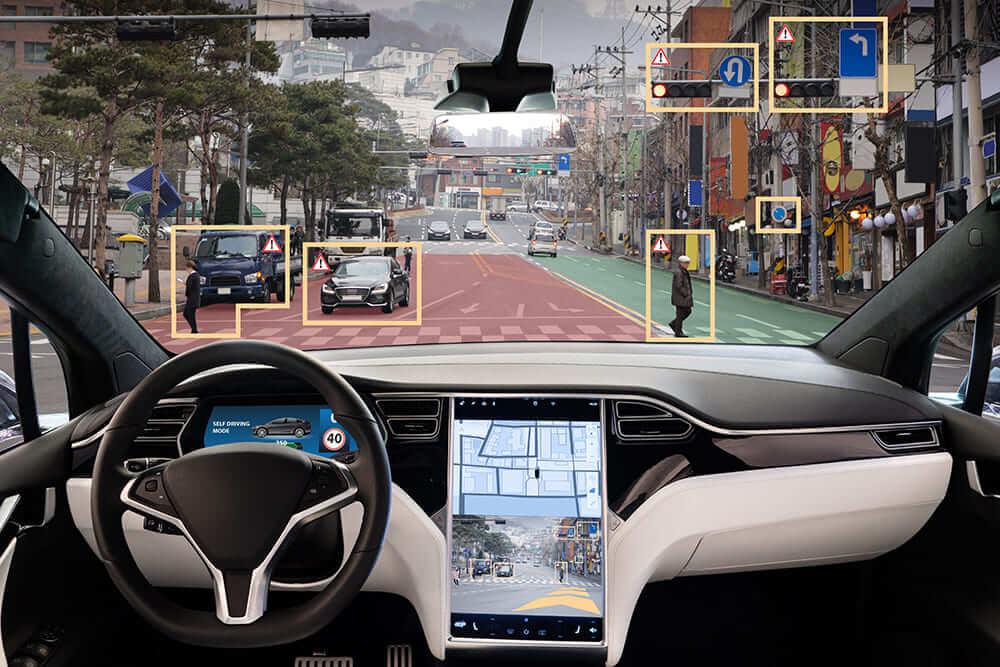TECHNOLOGY
Reshaping the Future of Transportation

Self-driving cars and machine learning have emerged as groundbreaking technologies revolutionizing the automotive industry.
With remarkable advancements in artificial intelligence (AI) and data analytics, self-driving cars have made significant strides, promising safer and more efficient transportation. This article explores the intersection of self-driving cars and machine learning, delving into key concepts, benefits, challenges, and future prospects of these cutting-edge technologies.
Understanding Self-Driving Cars
In the realm of transportation, self-driving cars, also known as autonomous vehicles, are equipped with advanced sensors, cameras, and onboard computers capable of navigating and making decisions without human intervention. These vehicles rely on a fusion of sensors, such as lidar, radar, and cameras, to perceive their surroundings. Through machine learning algorithms, the sensory data collected is interpreted and processed, enabling the vehicle to make informed decisions.
The Role of Machine Learning in Self-Driving Cars
Machine learning plays a pivotal role in the development and operation of self-driving cars. By analyzing massive amounts of data, machine learning algorithms can identify patterns, make predictions, and adapt to changing driving conditions. These algorithms are trained on diverse datasets consisting of various driving scenarios, allowing them to recognize objects, understand traffic patterns, and respond to complex driving situations.
Benefits of Machine Learning in Self-Driving Cars

One of the benefits of self-driving cars lies in their potential to reduce accidents caused by human error. Machine learning algorithms enable vehicles to analyze real-time data and respond swiftly, significantly enhancing safety on the roads.
In addition, self-driving cars have the potential to optimize traffic flow, reduce congestion, and enhance fuel efficiency. By leveraging machine learning algorithms, autonomous vehicles can navigate through intricate traffic scenarios, making informed decisions to optimize travel routes and minimize idle time.
Self-driving cars hold the promise of transforming mobility for individuals with limited mobility or disabilities. By eliminating the need for human drivers, autonomous vehicles can provide transportation options to those who may face challenges accessing traditional means of transportation.
Challenges and Limitations of Machine Learning in Self-Driving Cars
The widespread adoption of self-driving cars necessitates the development of comprehensive regulations and legal frameworks to ensure safety, liability, and ethical considerations are adequately addressed.
The successful deployment of self-driving cars relies on the presence of robust and intelligent infrastructure, including smart roads, communication networks, and reliable mapping systems. Building such infrastructure presents significant challenges that need to be addressed.
Ethical Decision Making: Autonomous vehicles face complex ethical dilemmas, such as determining how to respond in potential accident scenarios. Resolving these ethical challenges requires careful consideration and input from various stakeholders.
The Future of Self-Driving Cars and Machine Learning

The future of self-driving cars and machine learning is highly promising. As technology continues to advance, we can anticipate significant developments in the following areas:
Enhanced Safety
Machine learning algorithms will further improve the safety capabilities of self-driving cars, enabling them to predict and respond to potential hazards with even greater precision.
Intelligent Infrastructure
The development of intelligent infrastructure will play a critical role in the seamless integration and operation of self-driving cars. This includes the establishment of smart roads, robust communication networks, and accurate mapping systems.
Ethical Guidelines
Stakeholders will collaborate to establish comprehensive ethical guidelines for self-driving cars, addressing complex decision-making scenarios and ensuring public trust in this transformative technology.
What’s Next for the Use of Machine Learning in Self Driving Cars?
Self-driving cars, empowered by machine learning, are poised to revolutionize transportation as we know it. With their potential to enhance safety, improve efficiency, and increase accessibility, these autonomous vehicles offer a glimpse into a future where our roads are safer and transportation is more efficient. However, addressing regulatory challenges, developing intelligent infrastructure, and resolving ethical dilemmas will be crucial in realizing the full potential of self-driving cars and machine learning. As technology continues to evolve, we can look forward to a future where self-driving cars redefine the way we travel.
TECHNOLOGY
Next-gen chips, Amazon Q, and speedy S3

AWS re:Invent, which has been taking place from November 27 and runs to December 1, has had its usual plethora of announcements: a total of 21 at time of print.
Perhaps not surprisingly, given the huge potential impact of generative AI – ChatGPT officially turns one year old today – a lot of focus has been on the AI side for AWS’ announcements, including a major partnership inked with NVIDIA across infrastructure, software, and services.
Yet there has been plenty more announced at the Las Vegas jamboree besides. Here, CloudTech rounds up the best of the rest:
Next-generation chips
This was the other major AI-focused announcement at re:Invent: the launch of two new chips, AWS Graviton4 and AWS Trainium2, for training and running AI and machine learning (ML) models, among other customer workloads. Graviton4 shapes up against its predecessor with 30% better compute performance, 50% more cores and 75% more memory bandwidth, while Trainium2 delivers up to four times faster training than before and will be able to be deployed in EC2 UltraClusters of up to 100,000 chips.
The EC2 UltraClusters are designed to ‘deliver the highest performance, most energy efficient AI model training infrastructure in the cloud’, as AWS puts it. With it, customers will be able to train large language models in ‘a fraction of the time’, as well as double energy efficiency.
As ever, AWS offers customers who are already utilising these tools. Databricks, Epic and SAP are among the companies cited as using the new AWS-designed chips.
Zero-ETL integrations
AWS announced new Amazon Aurora PostgreSQL, Amazon DynamoDB, and Amazon Relational Database Services (Amazon RDS) for MySQL integrations with Amazon Redshift, AWS’ cloud data warehouse. The zero-ETL integrations – eliminating the need to build ETL (extract, transform, load) data pipelines – make it easier to connect and analyse transactional data across various relational and non-relational databases in Amazon Redshift.
A simple example of how zero-ETL functions can be seen is in a hypothetical company which stores transactional data – time of transaction, items bought, where the transaction occurred – in a relational database, but use another analytics tool to analyse data in a non-relational database. To connect it all up, companies would previously have to construct ETL data pipelines which are a time and money sink.
The latest integrations “build on AWS’s zero-ETL foundation… so customers can quickly and easily connect all of their data, no matter where it lives,” the company said.
Amazon S3 Express One Zone
AWS announced the general availability of Amazon S3 Express One Zone, a new storage class purpose-built for customers’ most frequently-accessed data. Data access speed is up to 10 times faster and request costs up to 50% lower than standard S3. Companies can also opt to collocate their Amazon S3 Express One Zone data in the same availability zone as their compute resources.
Companies and partners who are using Amazon S3 Express One Zone include ChaosSearch, Cloudera, and Pinterest.
Amazon Q
A new product, and an interesting pivot, again with generative AI at its core. Amazon Q was announced as a ‘new type of generative AI-powered assistant’ which can be tailored to a customer’s business. “Customers can get fast, relevant answers to pressing questions, generate content, and take actions – all informed by a customer’s information repositories, code, and enterprise systems,” AWS added. The service also can assist companies building on AWS, as well as companies using AWS applications for business intelligence, contact centres, and supply chain management.
Customers cited as early adopters include Accenture, BMW and Wunderkind.
Want to learn more about cybersecurity and the cloud from industry leaders? Check out Cyber Security & Cloud Expo taking place in Amsterdam, California, and London. Explore other upcoming enterprise technology events and webinars powered by TechForge here.
TECHNOLOGY
HCLTech and Cisco create collaborative hybrid workplaces

Digital comms specialist Cisco and global tech firm HCLTech have teamed up to launch Meeting-Rooms-as-a-Service (MRaaS).
Available on a subscription model, this solution modernises legacy meeting rooms and enables users to join meetings from any meeting solution provider using Webex devices.
The MRaaS solution helps enterprises simplify the design, implementation and maintenance of integrated meeting rooms, enabling seamless collaboration for their globally distributed hybrid workforces.
Rakshit Ghura, senior VP and Global head of digital workplace services, HCLTech, said: “MRaaS combines our consulting and managed services expertise with Cisco’s proficiency in Webex devices to change the way employees conceptualise, organise and interact in a collaborative environment for a modern hybrid work model.
“The common vision of our partnership is to elevate the collaboration experience at work and drive productivity through modern meeting rooms.”
Alexandra Zagury, VP of partner managed and as-a-Service Sales at Cisco, said: “Our partnership with HCLTech helps our clients transform their offices through cost-effective managed services that support the ongoing evolution of workspaces.
“As we reimagine the modern office, we are making it easier to support collaboration and productivity among workers, whether they are in the office or elsewhere.”
Cisco’s Webex collaboration devices harness the power of artificial intelligence to offer intuitive, seamless collaboration experiences, enabling meeting rooms with smart features such as meeting zones, intelligent people framing, optimised attendee audio and background noise removal, among others.
Want to learn more about cybersecurity and the cloud from industry leaders? Check out Cyber Security & Cloud Expo taking place in Amsterdam, California, and London. Explore other upcoming enterprise technology events and webinars powered by TechForge here.
TECHNOLOGY
Canonical releases low-touch private cloud MicroCloud

Canonical has announced the general availability of MicroCloud, a low-touch, open source cloud solution. MicroCloud is part of Canonical’s growing cloud infrastructure portfolio.
It is purpose-built for scalable clusters and edge deployments for all types of enterprises. It is designed with simplicity, security and automation in mind, minimising the time and effort to both deploy and maintain it. Conveniently, enterprise support for MicroCloud is offered as part of Canonical’s Ubuntu Pro subscription, with several support tiers available, and priced per node.
MicroClouds are optimised for repeatable and reliable remote deployments. A single command initiates the orchestration and clustering of various components with minimal involvement by the user, resulting in a fully functional cloud within minutes. This simplified deployment process significantly reduces the barrier to entry, putting a production-grade cloud at everyone’s fingertips.
Juan Manuel Ventura, head of architectures & technologies at Spindox, said: “Cloud computing is not only about technology, it’s the beating heart of any modern industrial transformation, driving agility and innovation. Our mission is to provide our customers with the most effective ways to innovate and bring value; having a complexity-free cloud infrastructure is one important piece of that puzzle. With MicroCloud, the focus shifts away from struggling with cloud operations to solving real business challenges” says
In addition to seamless deployment, MicroCloud prioritises security and ease of maintenance. All MicroCloud components are built with strict confinement for increased security, with over-the-air transactional updates that preserve data and roll back on errors automatically. Upgrades to newer versions are handled automatically and without downtime, with the mechanisms to hold or schedule them as needed.
With this approach, MicroCloud caters to both on-premise clouds but also edge deployments at remote locations, allowing organisations to use the same infrastructure primitives and services wherever they are needed. It is suitable for business-in-branch office locations or industrial use inside a factory, as well as distributed locations where the focus is on replicability and unattended operations.
Cedric Gegout, VP of product at Canonical, said: “As data becomes more distributed, the infrastructure has to follow. Cloud computing is now distributed, spanning across data centres, far and near edge computing appliances. MicroCloud is our answer to that.
“By packaging known infrastructure primitives in a portable and unattended way, we are delivering a simpler, more prescriptive cloud experience that makes zero-ops a reality for many Industries.“
MicroCloud’s lightweight architecture makes it usable on both commodity and high-end hardware, with several ways to further reduce its footprint depending on your workload needs. In addition to the standard Ubuntu Server or Desktop, MicroClouds can be run on Ubuntu Core – a lightweight OS optimised for the edge. With Ubuntu Core, MicroClouds are a perfect solution for far-edge locations with limited computing capabilities. Users can choose to run their workloads using Kubernetes or via system containers. System containers based on LXD behave similarly to traditional VMs but consume fewer resources while providing bare-metal performance.
Coupled with Canonical’s Ubuntu Pro + Support subscription, MicroCloud users can benefit from an enterprise-grade open source cloud solution that is fully supported and with better economics. An Ubuntu Pro subscription offers security maintenance for the broadest collection of open-source software available from a single vendor today. It covers over 30k packages with a consistent security maintenance commitment, and additional features such as kernel livepatch, systems management at scale, certified compliance and hardening profiles enabling easy adoption for enterprises. With per-node pricing and no hidden fees, customers can rest assured that their environment is secure and supported without the expensive price tag typically associated with cloud solutions.
Want to learn more about cybersecurity and the cloud from industry leaders? Check out Cyber Security & Cloud Expo taking place in Amsterdam, California, and London. Explore other upcoming enterprise technology events and webinars powered by TechForge here.
-

 WORDPRESS7 days ago
WORDPRESS7 days ago13 Best HubSpot Alternatives for 2024 (Free + Paid)
-

 MARKETING7 days ago
MARKETING7 days agoAdvertising in local markets: A playbook for success
-

 SEARCHENGINES7 days ago
SEARCHENGINES7 days agoGoogle Core Update Flux, AdSense Ad Intent, California Link Tax & More
-

 SEARCHENGINES5 days ago
SEARCHENGINES5 days agoGoogle Needs Very Few Links To Rank Pages; Links Are Less Important
-

 SEO5 days ago
SEO5 days agoHow to Become an SEO Lead (10 Tips That Advanced My Career)
-

 MARKETING6 days ago
MARKETING6 days agoHow to Use AI For a More Effective Social Media Strategy, According to Ross Simmonds
-

 PPC4 days ago
PPC4 days ago10 Most Effective Franchise Marketing Strategies
-

 PPC5 days ago
PPC5 days agoBiggest Trends, Challenges, & Strategies for Success














